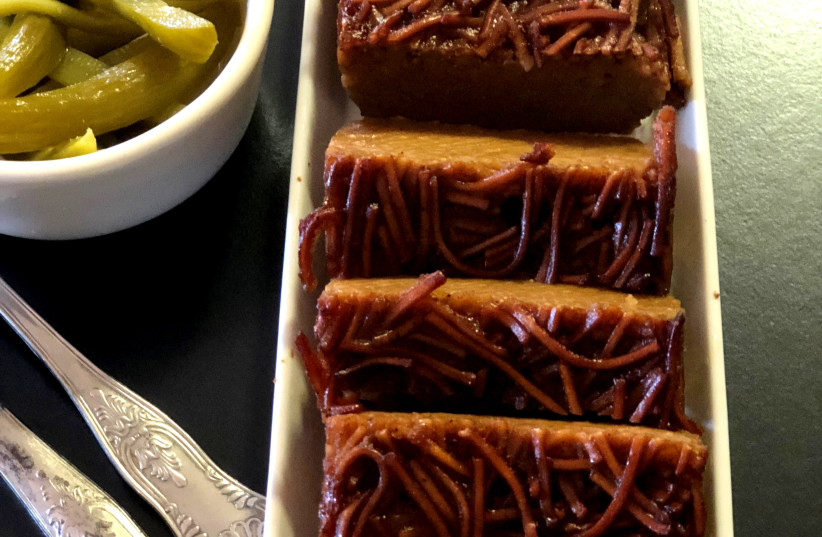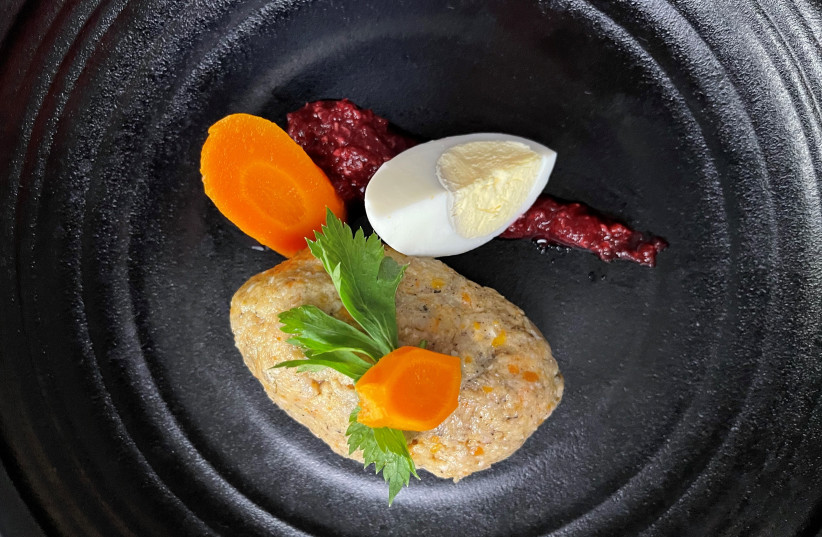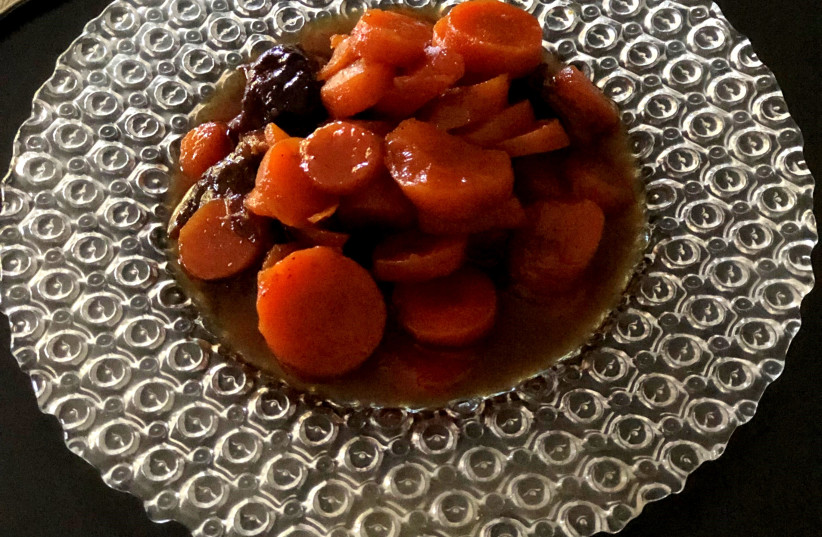This week, I will be bringing recipes from traditional Eastern European Jewish cuisine. For anyone who grew up eating these delicacies, just reading about them might bring back vivid childhood memories of mothers and grandmothers preparing them for Shabbat and festive holiday meals.
These dishes were adapted to the kosher Ashkenazi kitchen, with recipes that were passed down from one generation to the next – just as was done with recipes in Sephardi communities.
If you walk down the bustling streets of Bnei Brak, you will find dozens of vendors selling herring, kreplach, ptcha, chicken soup with noodles, chopped liver, cholent, an assortment of kugels and challot.
One especially popular establishment is Aspargus Delicatessen, offering an assortment of authentic Ashkenazi delicacies served with a dash of trendy modernity. The deli is run by chefs Eli Pinsler and Moti Tauber, who grew up eating Polish and Hungarian dishes that included a splash of sweetness from dried fruit, apples, orange juice and wine. I was lucky enough to have Moti join me recently for a cooking session in my kitchen.

We began with kugel. If you’ve ever wondered what the difference is between kugel and kigel, you’ll be happy to know that they are just different pronunciations of the same dish. Kigel is the way Jews from Galicia (parts of modern-day Poland and Ukraine) pronounced the word, and kugel is what Jews from Germany and Lithuania called the dish.
Traditionally, kugel is cooked in a thick and tall copper pan that was called keseleh, meaning a small pan. This was an essential item supplied to Jewish women when they married. The keseleh somewhat resembles the tagine from North African cuisine, except the former is made from copper, and the latter is ceramic. One the keseleh’s trademarks is the way it strongly retains the steam while cooking, giving kugel its beautiful brown hue.
There are numerous variations of kugel, with noodle thickness being the most common difference; thin, thick or medium noodles can all be used. Some families add fried onion while others include raisins and nuts. Some use larger amounts of sugar, others more salt.
Another well-loved delicacy from Jewish Ashkenazi cuisine is tzimmes, a sweet dish made with carrots and prunes and traditionally eaten on Rosh Hashanah.
The most iconic dish from Jewish Ashkenazi cuisine is, of course, gefilte fish, which is served at every holiday meal, especially on Rosh Hashanah and at the Passover Seder. Gefilte fish is most often found in two forms, either as balls or as balls stuffed into the hollow of slices of carp.
And last but not least we have cholent, a term which may come from the French chaud-lent, meaning “hot-slow.” Another idea is that the “len” part of the word comes from the Hebrew word meaning to sleep, since the dish cooks all night long; or, less likely, from the Yiddish shul ende, which describes when the cholent is eaten – at “synagogue end.”
There are numerous recipes for preparing Ashkenazi cholent, but all of them include beans, barley or wheat, chicken or beef, potatoes and spices. Definitely considered a comfort food by many, cholent is a fundamental dish found among religious Jews, since cooking on Shabbat is forbidden.
Of course, no festive meal would be complete without dessert. The classic dessert served by Ashkenazim at festive meals is apple compote with cinnamon, served cold.
<br>Cholent
Makes 10 servings.
- 1 cup oil
- 3 onions, chopped
- 2 Tbsp. paprika
- 1 Tbsp. sugar
- 1 Tbsp. salt
- ½ Tbsp. black pepper
- 800 gr. beef ribs, deboned, and cut into chunks
- 1 cup white and red beans, soaked in water overnight
- ½ cup pearl barley, soaked in water overnight
- 2 large red potatoes, peeled and cut into large pieces
- 1 liter beef broth
- Water, as needed
- 1 frozen prepared kishke
- Heat the oil in a large pot and sauté the onion until it turns golden. Add the spices and sauté a bit to open up their flavor. Add the beef and sear on all sides. Add the potatoes, beans and barley. Add the beef broth and add water to cover. Bring to a boil. Add the kishke. Lower the flame and cook for 30 minutes. Move pot to a Shabbat hot plate and let it continue cooking for 12 hours or overnight, or place pot in an oven that has been preheated to 100° and leave it there overnight.
Level of difficulty: Easy.
Time: 50 minutes.
Status: Meat.
<br>Jerusalem noodle kugel
Makes 2 loaf pans or 1 round kugel with diameter of 22-24cm.
- 1 kg. thin or wide egg noodles
- 2-3 Tbsp. oil
- 200 gr. sugar
- 5 medium eggs
- 15 gr. salt
- 2 tsp. black pepper
- 1 tsp. cinnamon
Cook the noodles in salted boiling water according to directions until they are al dente. Drain and rinse in cold water. Transfer noodles to a bowl and add the oil. Mix well.
Heat the oil in a large pan and add sugar. Stir continuously until the sugar turns amber/brown. Keep stirring so the caramelized sugar does not burn. Remove from the flame and pour on top of cooked noodles. Mix well and then add the eggs, salt, pepper and cinnamon. Mix well.
Line a pan lined with baking paper and grease lightly. Transfer the noodles to the pan and flatten. Bake in an oven that has been preheated to 150° for 3.5 hours. The top will have turned dark and shiny.
Level of difficulty: Easy-medium.
Time: 30 minutes + 3.5 hours for baking.
Status: Pareve.

Gefilte fish
Makes 5 servings.
Gefilte fish broth:
- 2 carp skeletons (350-400 gr.)
- 2 medium carrots, peeled and cut into large pieces
- 2 medium onions, quartered
- 1 cup sugar
- 2 liters water
- Salt and pepper, to taste
Gefilte fish balls:
- 500 gr. carp filets
- 1 carrot
- 1 medium onion
- 1 hardboiled egg
- ½ cup matza meal
- 2 medium eggs
- Salt and pepper, to taste
Serving suggestions:
- Carrots cooked in broth, sliced
- Parsley
- Hardboiled eggs, halved
- Horseradish
Add all the broth ingredients to a large, tall pot and bring to a boil. Lower the flame and cook for 20 minutes.
In a food processor, grind the fish, carrot, onion and hardboiled egg together. Transfer to a large bowl. Add the matza meal, 2 eggs, salt and pepper. Mix well, cover with plastic wrap and place in the fridge for 30 minutes.
Pour some oil on your hands, or wet them with water, and then take a bit of gefilte fish mix and form elliptical balls the size of your palm. Place the balls carefully into the broth. You can shake the pot a little to make sure each ball has space. Cook over a medium-low flame for 2 hours.
Remove the gefilte fish balls, drain and retain the broth (it will turn into jelly as it cools). Slice the carrots. Place the gefilte fish balls on a serving platter and place carrot slices and pieces of parsley on top of fish balls. Serve with hardboiled egg halves, horseradish and jlly.
Level of difficulty: Medium.
Time: 3 hours.
Status: Pareve.
<br>Bubbie’s apple compote
Makes 5 servings.
- 5 large granny smith apples, peeled
- 1 cup dry red wine
- 1 cup sugar
- Juice from ½ lemon
- 1 whole cinnamon stick
- ½ cup light raisins
- ½ cup prunes, pitted
- Water to cover
Cut the apples into eighths and cut out core. Add the wine, sugar, lemon juice and cinnamon to a large pot. Bring to a boil over a medium flame. Add the apples, raisins, prunes and water to cover. Mix and cook for 15-20 minutes until most of the water has evaporated. Let cool and store in the fridge until serving.
Level of difficulty: Easy.
Time: 50 minutes.
Status: Pareve.

Tsimmes
Makes 5 servings.
- 500 gr. carrots, peeled and sliced into ½ cm thick pieces
- 100 gr. prunes, pitted
- 80 gr. dark or light raisins
- 1 whole cinnamon stick
- 50 ml. sweet red wine
- Juice from 5 oranges
- 100 gr. brown sugar
- 60 gr. margarine, cut into cubes
In a large pot, mix together the carrots, prunes, raisins and cinnamon. Add the wine, orange juice, brown sugar and margarine. Mix well and then pour in water to cover. Heat over a medium flame and bring to a boil. Cover with baking paper and cook for 30 minutes over a low flame until all the ingredients have softened.
Level of difficulty: Easy.
Time: 40 minutes.
Status: Pareve.
Translated by Hannah Hochner.
